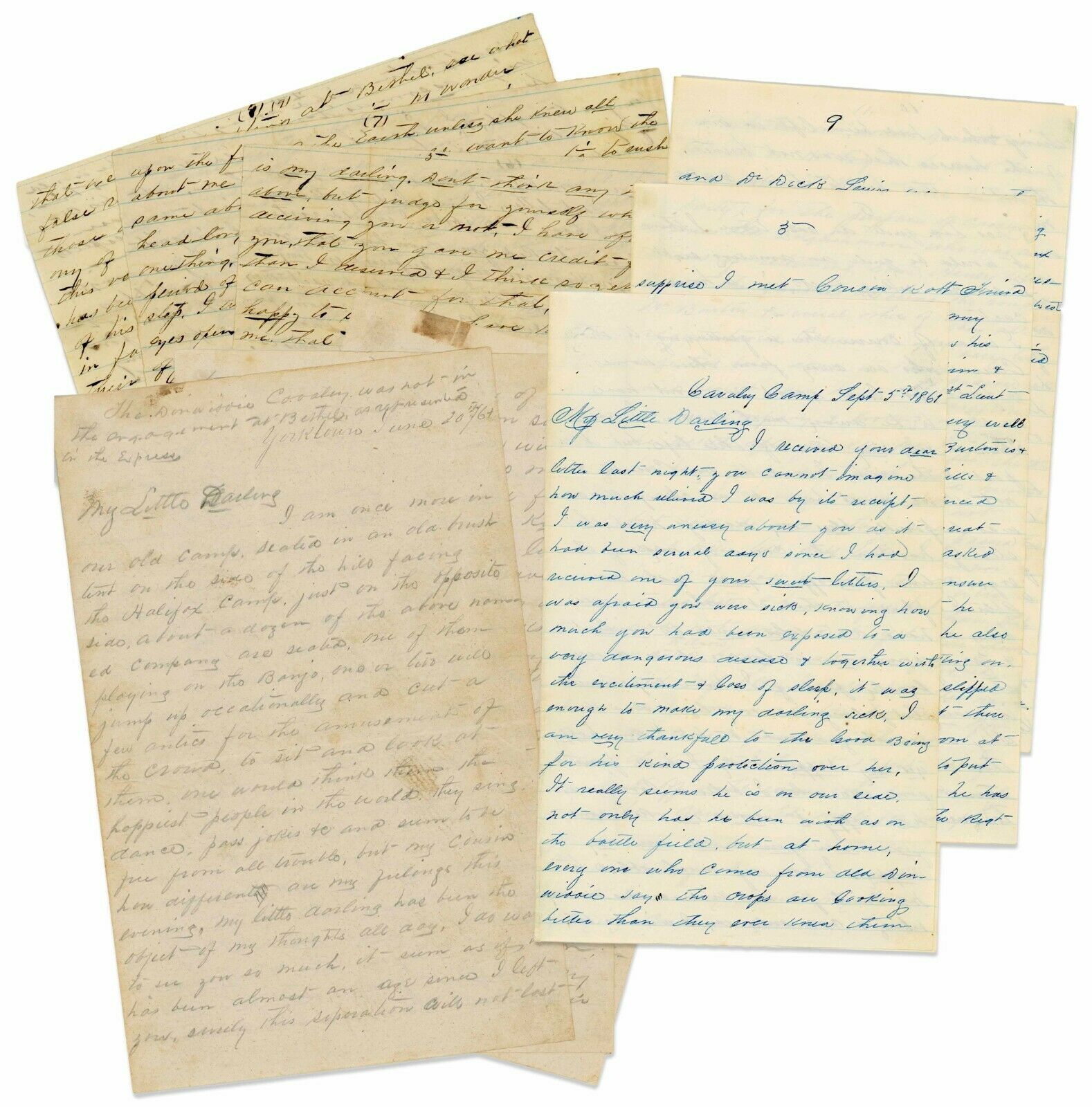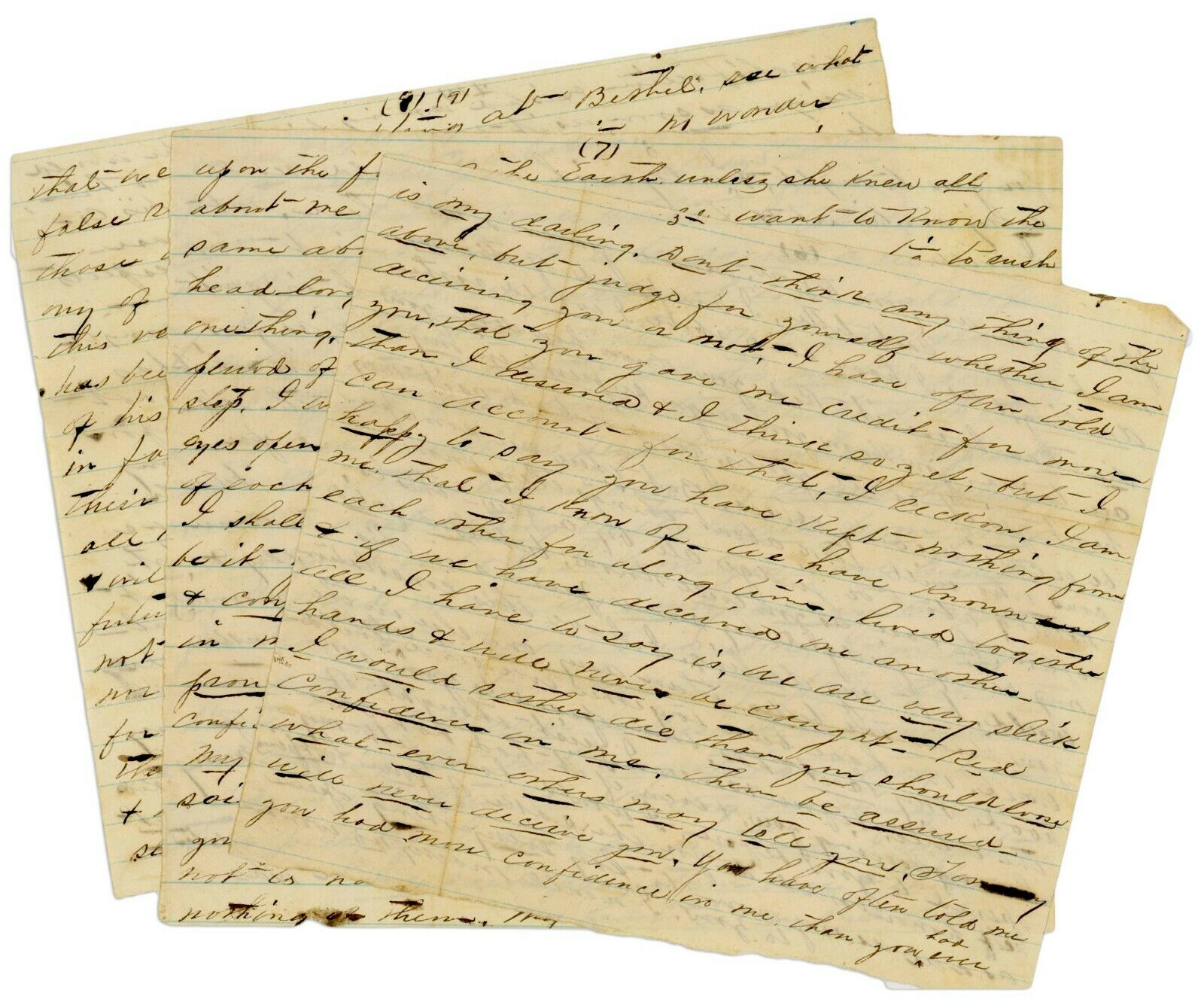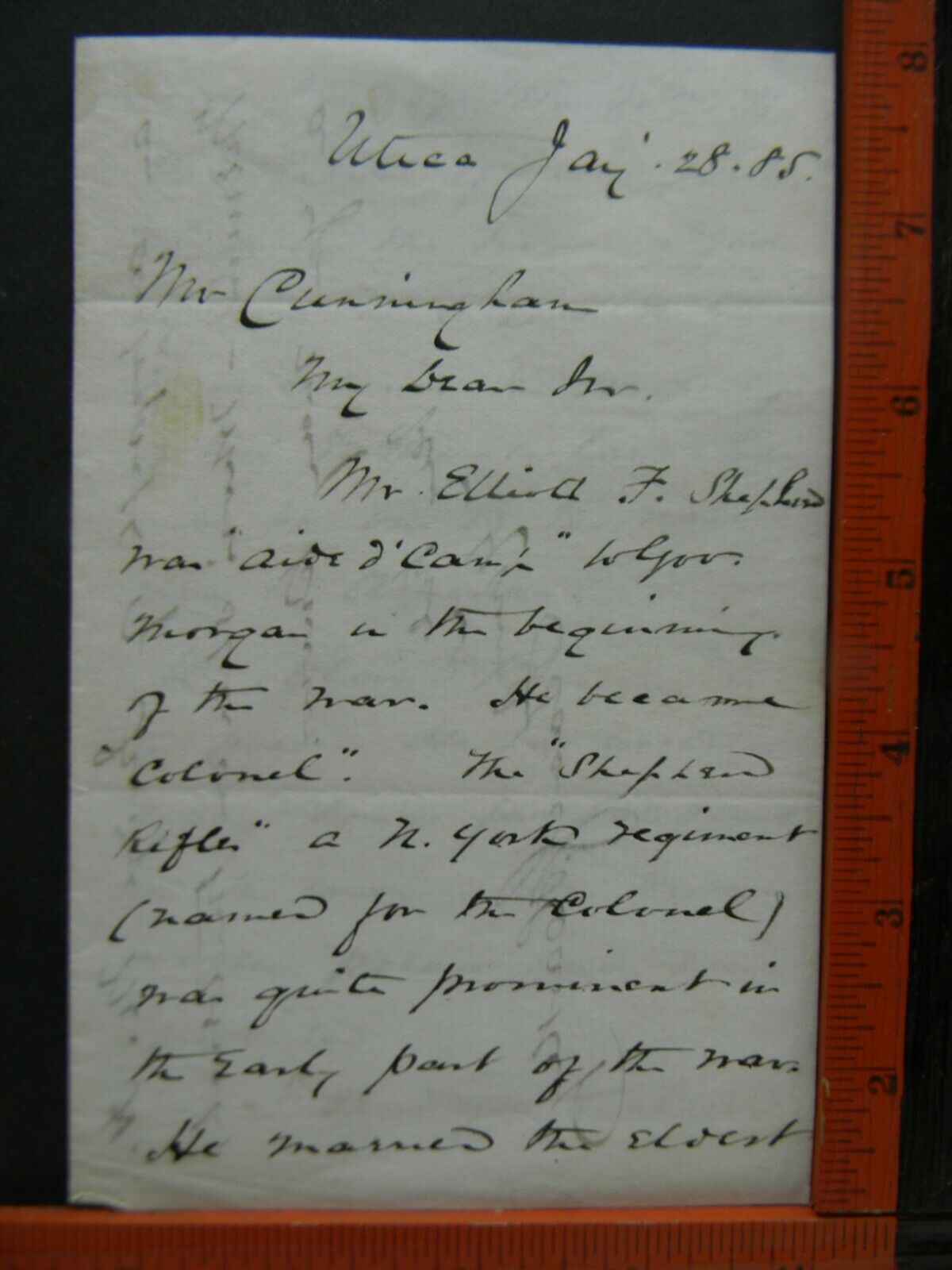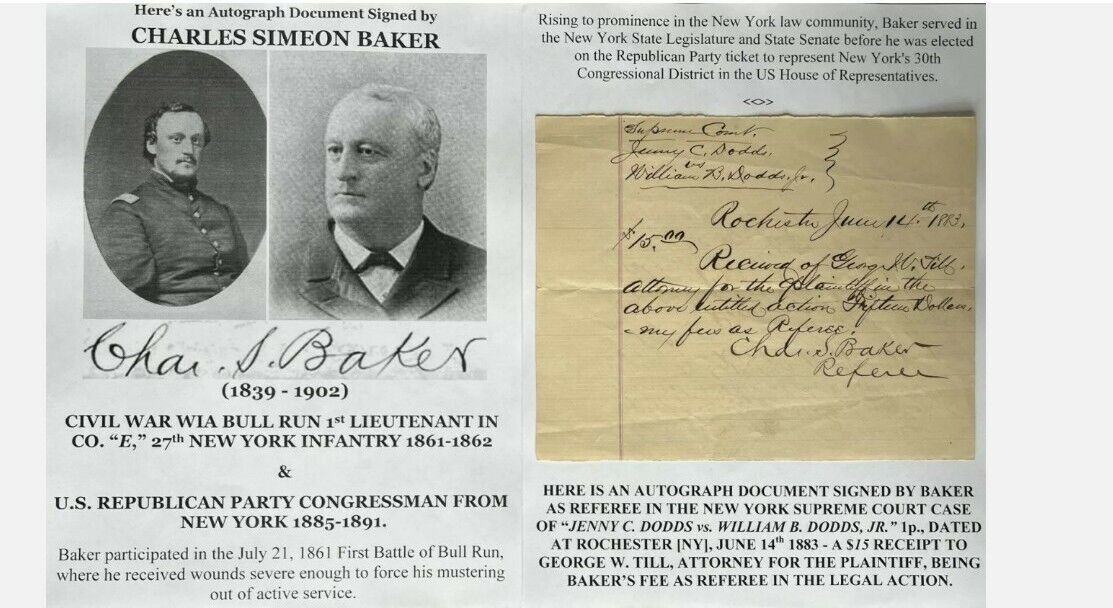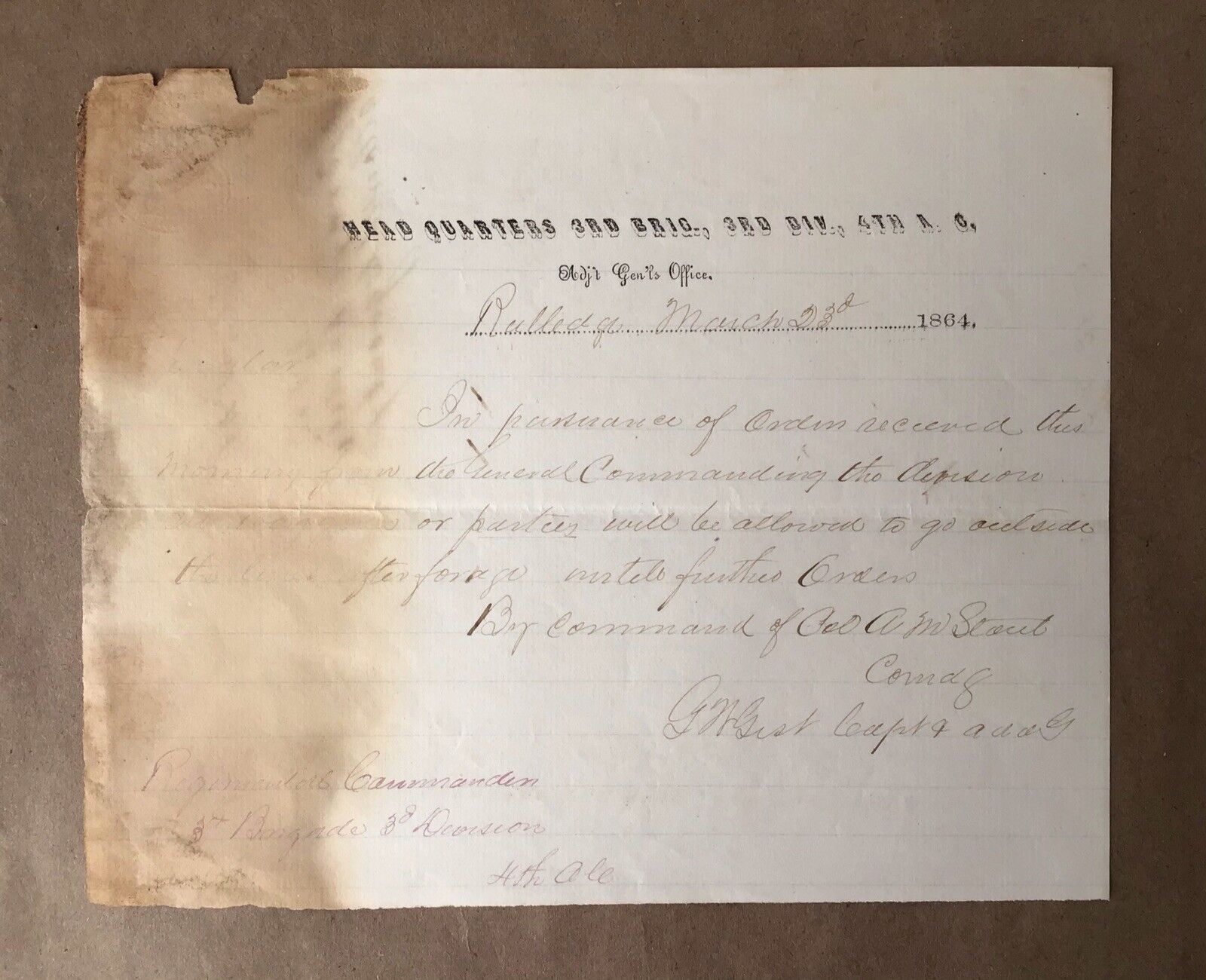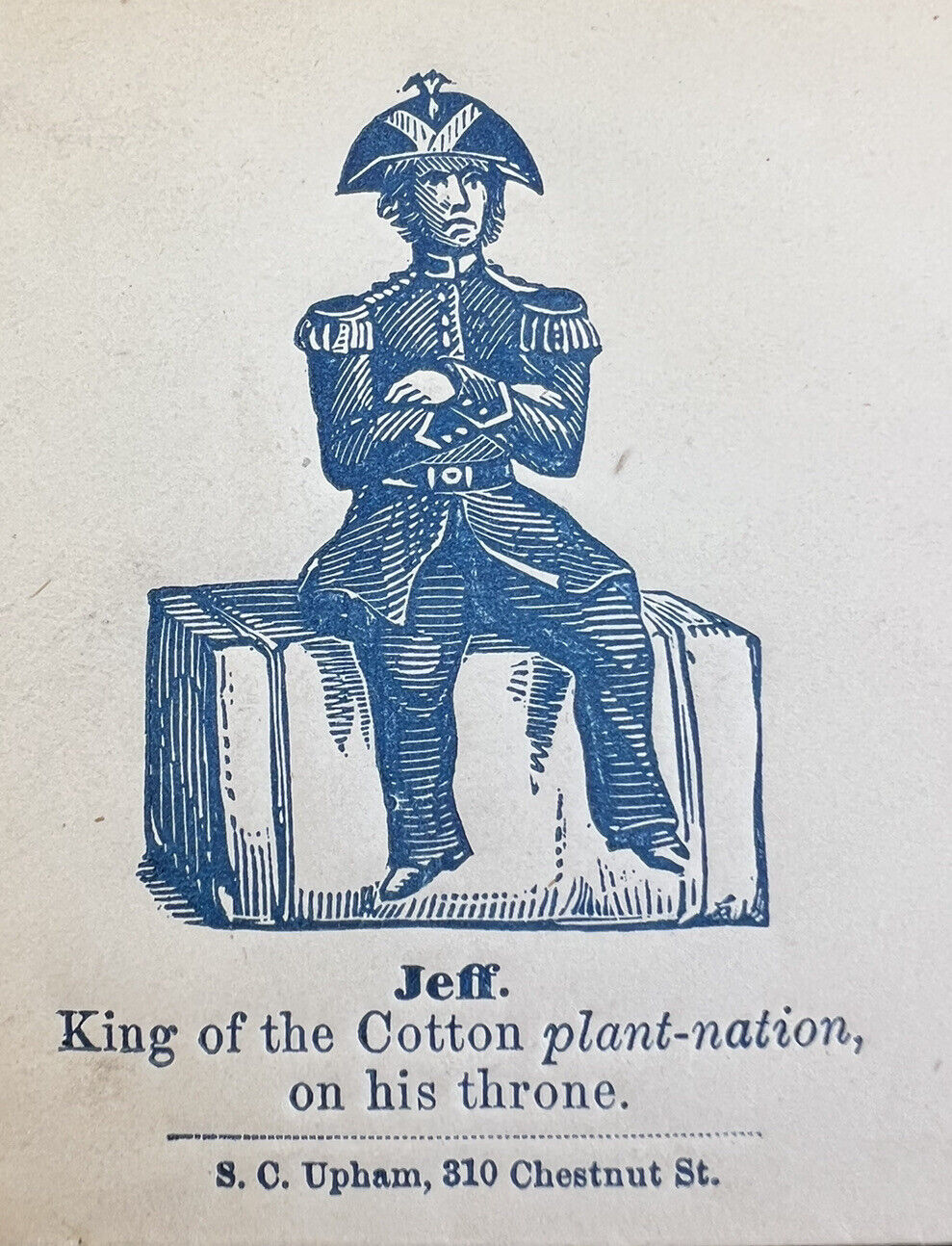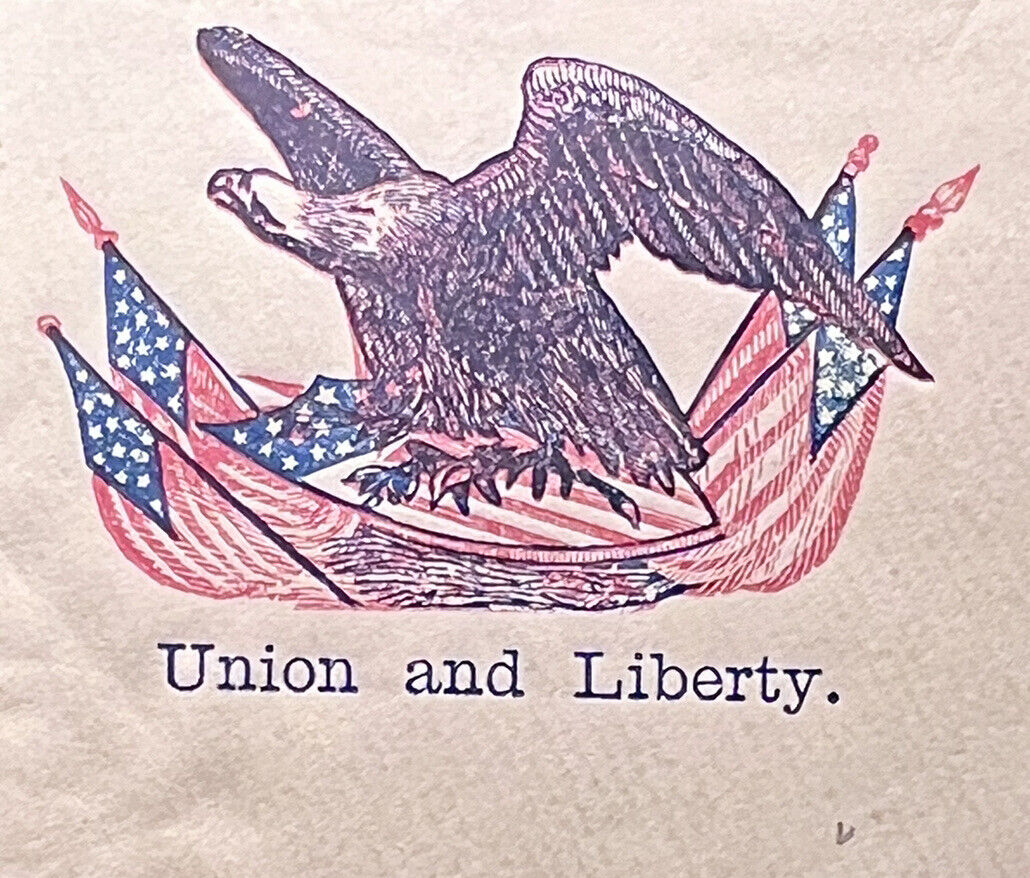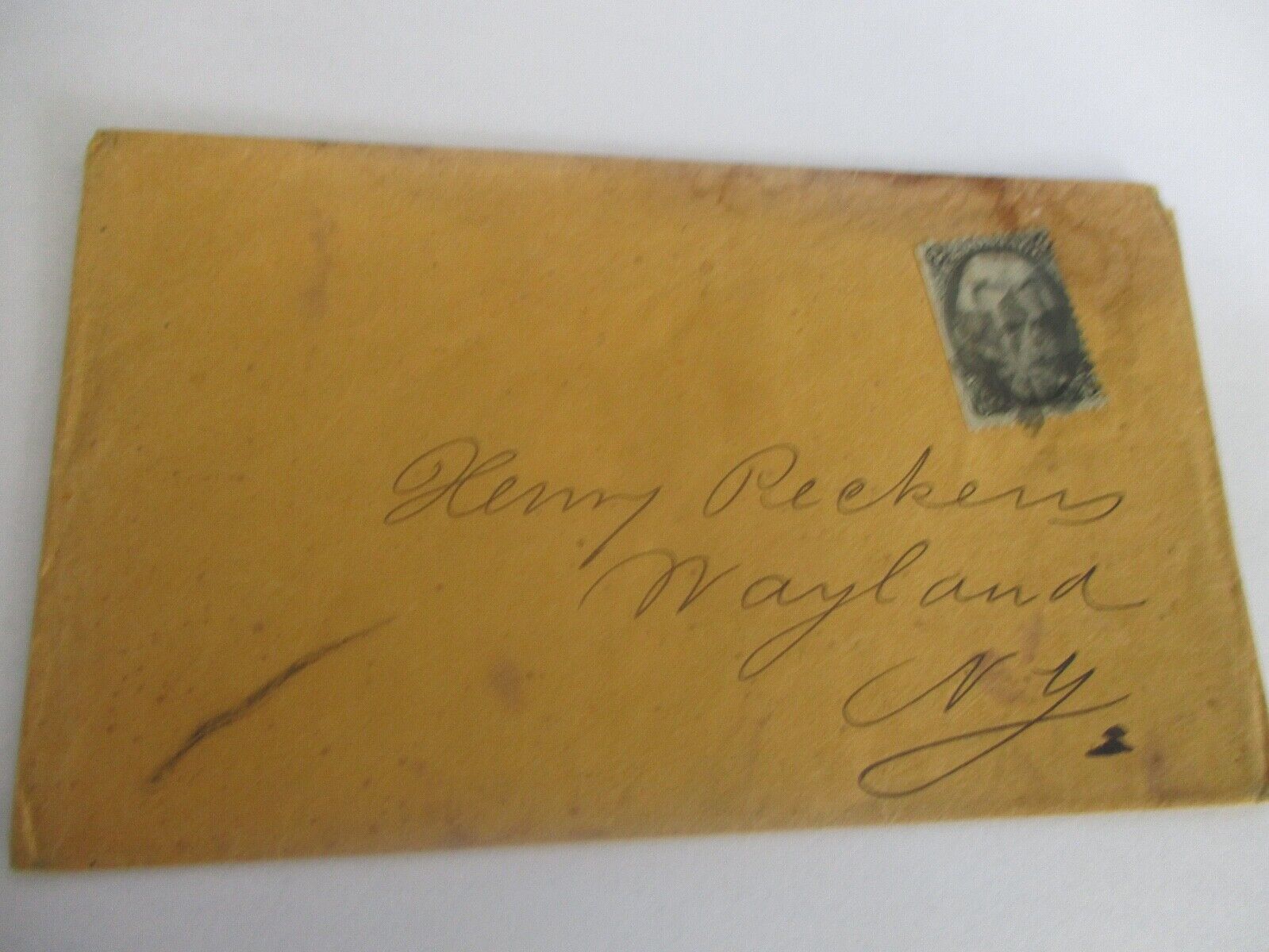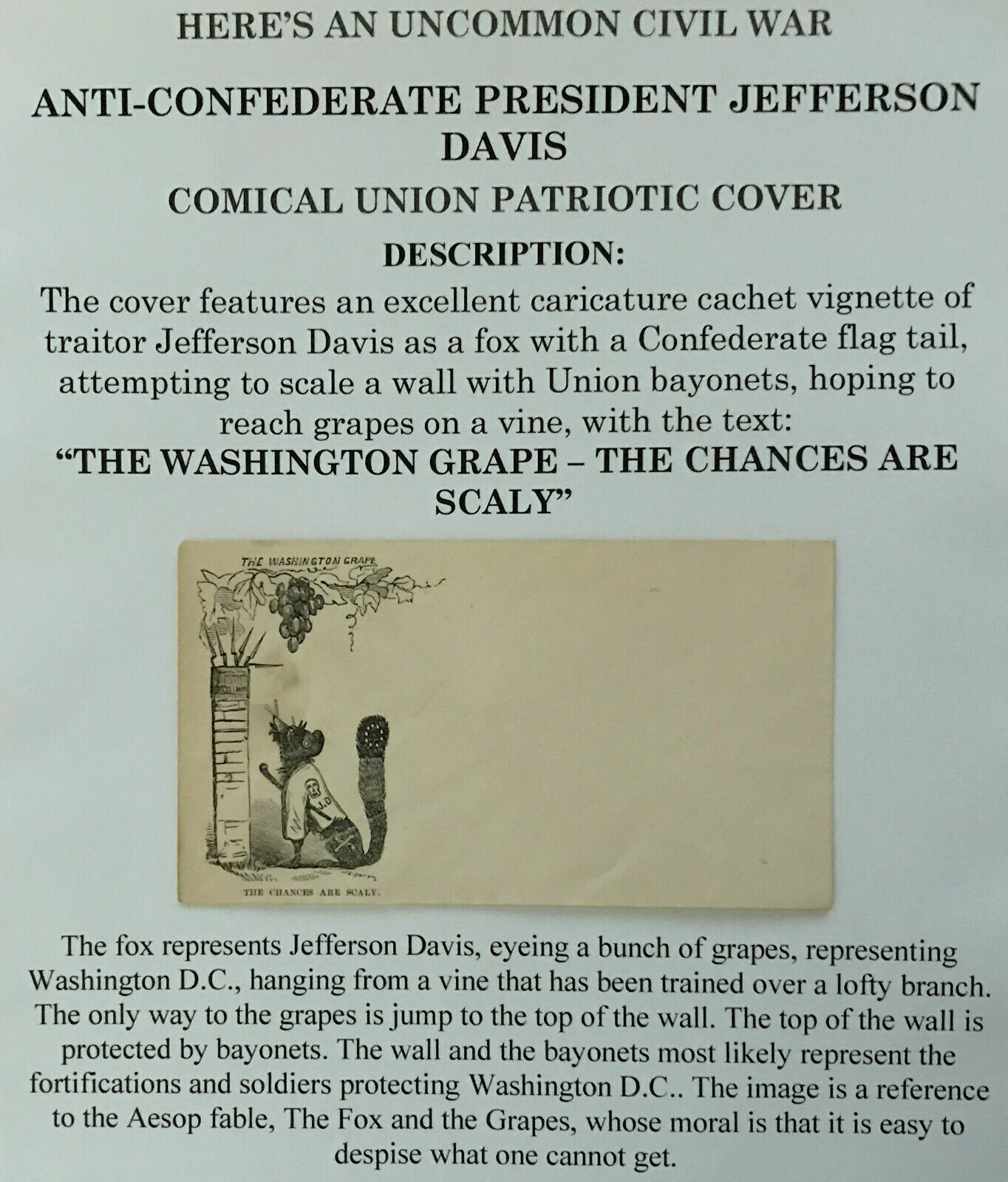-40%
17 Civil War Letters by a 3rd Virginia Cavalryman
$ 5280
- Description
- Size Guide
Description
Lot of 17 letters by Thomas B. Booth, a Virginia Military Institute graduate and member of the 3rd Virginia Cavalry, Co. I. Booth would ultimately be wounded in 1862 but before his service to the Confederacy ended, he participated in numerous skirmishes and in the Battles of Rich Mountain and Lee's Mill, which he describes in his letters back home to his sweetheart. Booth's letters are lengthy, descriptive and well-written. His first letter home on 20 June 1861 describes secondhand the Battle of Big Bethel, "eight thousand Yankees were marching down the Warwick Road either to attack Yorktown or to attempt to cut us off from the forces at Yorktown (I mean to cut off the forces at Bethel) about 2,000 or 2,500 strong…a gentleman told us Bethel had been evacuated. I immediately turned my eyes in that direction and saw a very large smoke rising. Upon getting there I found all the tents burning and all the baggage the poor soldiers could not carry on their horses left upon the ground…As soon as the news came, the Zouaves were ordered to double quick about three miles to the road the enemy would have to travel in order to get to Yorktown. When they got there they found no enemy had passed were then ordered to march to York as quick as possible. The whole road was now alive with men and horses for miles. My sympathy was amply aroused when I saw the poor fellows dropping off one by one on the roadside from utter exhaustion. The heat of the sun was very overpowering and the immense fog of dust which at times entirely hid the river in front of me from sight was enough to kill both men and beast. I believe the Zouaves were the only ones who gave out owning to the jaunt of three miles double quick…I am sorry to say our 3rd Lieutenant was shot last Tuesday just above the knee by a party of stragglers from the Georgia regiment. Each thought the other enemy and as there were only two of our men together, lieutenants going around to the different posts to see if the videttes knew their duty. After a few questions had been asked by them which were not answered satisfactory to our men and as their numbers were large, they turned to make their escape then one, Lieutenant Neves, was shot just above the right knee after passing through the fleshy par of his horse's rump. He was the man who applied to Magruder for a furlough and was refused it. He left for home last Wednesday morning. I know this will distress his poor wife who is very ill. Another man was shot last night while removing the baggage from Bethel by the vidette stationed for the time. I suppose he must have thought it was the Yanks coming. The man was slightly wounded…"In his next letter home, Booth describes General Magruder playing a trick on the Yankees, congregating his men on a high hill overlooking the Yankees' camp, "to frighten them a little." He then describes an afternoon of tracking Yankees in the woods, just out of their gunshot range with the two sides trying to intimidate the other. He ends his letter by mentioning President Lincoln's message to Congress on July 4, 1861, "Our captain has just finished reading the President's message to us. I must think Old Abe is deranged."
In the next letter, dated 13 July 1861, Booth describes the Battle of Rich Mountain two days prior, "…The Mecklenburg company being armed with carbines & four Lousianans who were down here scouting on their own hook were thrown on the front & the companies armed with shotguns were ordered to mount & hold themselves in readiness for a charge as soon as all of the enemy's guns had been discharged. By this time the enemy had concealed themselves in the thick woods on each side of the road. Our noble officer with his little hand full of men pressed bravely onward keeping in the edge of the thicket until in shooting distance of the enemy, when they were fired upon. But as in the battle of Bethel, the Yankee's balls passed far above their noble heads. In spite of the fast flying balls & the many commands given by the Yankee officers to make our men believe they had a large force behind, pressed forward. A few fires from our side was all that was needed to put the unprincipled hirelings to flight. Away they went through the woods, some of them almost forgetting they had a gun. I am happy to say our men stood to their posts nobly & manly. I never saw a cooler & more determined set of men in all my life…When they began to retreat the reserve companies were ordered to charge. But owing to the thickness of the woods in which the Yankees fled for protection it was thought imprudent to venture in altough some few of the Mecklenburg troopers heedless of the danger they were rushed madly in & succeeded in taking some two or three prisoners after they had reached this large body of woods. We charged down the road to an open field & saw three passing across at double quick time. The fence was immediately thrown down & away went the horsemen in pursuit of the fast retreating Yankees. As soon as they were overtaken they threw up their hands & begged for quarters. The gentleman who had taken one of them, as he thought, turned his head to see if he could see any more crossing the field. When the Yankee saw this he threw up his gun & fired after surrendering. Fortunately he missed his aim. The gentleman said the ball passed in a few inches of him. As soon as the rascal shot, he again took to his heels. He was fired upon by the same gentleman & the ball taking effect in the hip. He of course fell. A member of the Charles City Troop had his horse shot from under him while crossing the open field. He was ahead of me. / Our commander thinking it would be imprudent to remain any longer as they could be reinforced very easily & in fact one of the prisoners said they had a large force ready at the camp to start as soon as the news could reach if they had an engagement. We then marched down the road to Lee's store where we formed a line to ascertain if any of our men had been killed. I am truly glad to say not a single one of our men got a scratch. We had eleven prisoners. I am unable to say how many were killed as we did not go into the woods to look for them. We picked up those lying on the side of the road. One dead, two wounded. The men who were sent after him said they heard them groaning in the woods, but they were ordered not to leave the road on any account. The dead one was left at Lee's store for the pickets to bury…We marched into camp about six o'clock & all the shouting you ever heard in your life would not compare with the shouts of those remaining in camp…I had no idea I could keep as cool in an engagement as I did yesterday. Before the firing commenced, I asked God's protection over one & all of my friends & Red I really felt He would. How thankful I am to Him for His protection over me. It is really a miracle that some of us was not killed. One of our company got a shot. They said he killed the man he shot at. We were thrown behind for a rarity & before we could get up those three who were passing across the field were taken…"
In a letter dated 29 August 1861, Booth writes that a fellow soldier fired at a Yankee, when "they could have taken him prisoner with all ease. I am truly glad they did not kill him as I would have been ashamed of them." He then writes about this disgust with individuals trying to play both sides of the war, "I think General Magruder ought to compel them to take some position for there are quite a number of them who pretend to be friendly to both parties by wearing a white band around their hats to pass themselves by us & raising a white flag in front of their houses to keep the Yankees from destroying their property. This is no time for neutrals. Every man should respond to his country's call & free their soil from threat of degraded Lincolnites who have come to invade & destroy our once beautiful & happy country, murder devoted husbands & turn the widow with her fatherless children out upon the world to mourn & to suffer…"
In his letter dated 6 November 1861, Booth describes an encounter with two Yankees who commandeered a house where they were "shooting hogs". Booth relates that the captured prisoners "say their chief dread is the Virginia horsemen." In his next letter on 11 November, Booth describes a clever ambush by the Yankees on a group of their men, who "immediately wheeled & started back to us at full speed. / None of us expected to see a single man return but fortunately all five came up the hill & the balls flying at them at a fearful rate. Only one was struck & he was the very man who was sent down to shoot the man who concealed himself. One ball entered the left side, glanced around the ribs, & came out of his back so I am told. I only saw the hole in his jacket as he passed me. But I am truly glad to say it is merely a flesh wound & the ball did not make a long wound, but merely passed through the flesh on the left side. Another ball struck the carbine we had slung around him. Another cut the edge of his pistol holster which was hanging on his left side. Quite a narrow escape. I am forced to believe he will not be killed in this war if he recovers from this wound, which I hope he will do very shortly…we were ordered back to the place of artillery & formed a line right behind it. A shell was then thrown where the Yankees were concealed or rather they tried to throw it there, but it burst in the air & I suppose right over them as they were seen running towards Newport News. They also fired two canister shots at the woods or swamp but I am afraid they did no damage. We then remained there some time waiting for them to come over the creek but they did not show themselves except when running towards Newport News. After seeing they had no idea of giving us a fight we returned to camp. Never mind, we will pay them for this yet. Oh how my blood boils when I think of them…"
In his letter dated 17 November 1861, Booth describes a freak accident with a man accidentally shooting himself in the forehead, "another very sad accident has happened to one of the Halifax Black Walnut Troopers. Yesterday he was sent to a post called Messex. After getting there he went to a fodder stack to get feed his horse and, stooping over to pick up the fodder, his pistol fell from his holster striking the ground in such a manner as to cause it to fire the ball entering his forehead just above the eye. When I heard from him last night he was in very critical condition. The name of the unfortunate man is Poindexter. It seems as if misfortunes are coming upon us thick & fast, but we have no cause to complain. We have been very very fortunate up to the first of last week & I am really thankful for the protection that has been extended over us…"
In a letter dated 29 November 1861, Booth describes a Confederate retreat from a Yankee ambush and how disturbed the troop was that they couldn't retrieve one one of the bodies, "I suppose the poor fellow who was shot, whether killed or wounded, was carried off by the Yankees. The members of the troop seem very much disturbed about their having his body…" On Christmas Day 1861, Booth describes another ambush, "Last Sunday, Colonel Winston with about 150 infantry & three companies of cavalry (The Old Dominion, Halifax, & New Kent) went on a scout with the cavalry in advance. When near New Market Bridge the advance guard was fired into by an ambush party, but I am glad to say they did very little damage. One trooper, a Mr. Bain, a member of the Old Dominion was slightly wounded in the foot. One horse killed & another wounded. The infantry being but a short distance in the rear rushed up & pitched into the woods completely routing the party. They were pursued & ran across the south branch of Back River. The Yankee loss is unknown, some eight or ten bodies were seen lying about the woods. One was taken prisoner also then was taken from them. One of Colonel Winston's men was shot through the head & instantly killed. Three others were wounded…"
He continues, "While the skirmish was going on, one of the wounded men was placed behind one of Colonel Winston's couriers & started to camp. But e'er that had gone very far they rode into another party who had gone in the rear of our men & ambushed & were waiting for them to return. But they were discovered by the courier. He immediately wheeled his horse & started back to report the fact to the colonel. When they were fired upon, the wounded man received another wound. As the party was very large & our force small, the colonel thought it best to make his escape through the woods. He did so & reached camp without coming in contact with this second party. Surely they were very fortunate. This is another evidence of God's protection over us…"
In his last letter, dated 20 April 1862, Booth describes the Battle of Lee's Mill, where McClellan attempted to assault General Magruder's fortifications along the Warwick River. Booth writes, "…the 5th North Carolina & 7th Georgia & 2nd Louisiana were engaged. The first named suffered most as I before stated. The official report states 21 killed, 61 wounded. Quite heavy, but small in comparison to the loss of the enemy as stated by the prisoners. They say their loss in killed & wounded must be at least 1000. General Magruder sent over a flag of truce yesterday for them to came & bury their dead as they had not taken any steps towards paying the last tribute of respect to their unfortunate comrades. They complied with the request of General Magruder but were not allowed to cross over on our side. Their dead were carried over to them but they did not get all of them as a great many fell & died in the pond of water while in the act of crossing. Last night about 9 o'clock (although the rain was coming down in torrents) the Yankees tried to get across the pond & surprise our camp but they were met with a warm reception & were compelled to retire…" Booth then closes out the letter by writing about the conscription bill, "The Conscription Bill has been passed & that forces all persons between the ages of 18 & 35 years into the service for three years. The twelve month volunteers credited for time of service. Therefore, I will have to remain two years longer if the war lasts that long." He would however, become seriously wounded about two weeks later, ending his service in the Confederate Army. Most of Booth's letters run several pages long, with nearly all composed in ink and accompanied by original mailing envelopes. With full transcriptions.
We accept PayPal and Credit cards via Paypal. Please provide a daytime phone number to be used in case of any shipping difficulties. Customers are advised that they are responsible for payment of any international duties and/or taxes. California residents will be charged 9.5% for sales tax. Also, please note that shipping includes signature confirmation upon delivery, but not insurance. If you request insurance, let us know and we'll send a revised invoice. Thank you!
